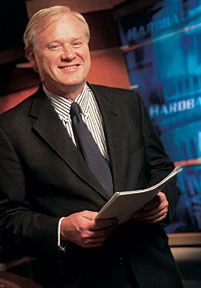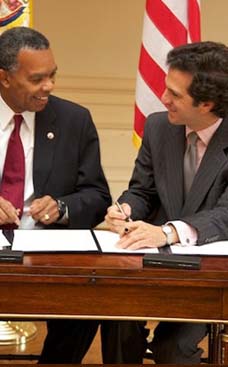
"Forty years ago on May 4th there were campus protests around the country against President Nixon's decision to invade Cambodia. But when the Ohio National Guard opened fire at Kent State and four students died, in the eyes of many the government lost moral authority. After Kent State the fight against the war took on a darker, more violent dimension. On May 14th, two students at Jackson State in Mississippi were shot dead by police, and later that summer came the bombing of the science research lab at the University of Wisconsin. In '71, someone planted a bomb right in the US Capitol."
Chris Matthews remembers Kent State Killings
Yesterday's Hippies, Today's Lib Reporters Reminisce About Kent State on Chris Matthews Show
By Geoffrey Dickens (Bio | Archive)
Tue, 05/04/2010 - 16:32 ET
Today marks the 40th anniversary of the Kent State shootings, and over the weekend Chris Matthews and his liberal cronies, on his syndicated The Chris Matthews Show, previewed the event as they reminisced about where they were at the time. Their memories reflect how anti-war they were back then and how that moment shaped them into the libs they are today as Matthews revealed the likes of his guests, like Newsweek's Howard Fineman and CNN's Gloria Borger, as students, were "editorializing against the war."
In his teasers for the segment Matthews set the table by claiming Kent State marked the time when "The sweetness of the anti-war movement turned sour" and "in the eyes of many the government lost moral authority." While the Chicago Tribune's Clarence Page was actually serving in the Army at the time, the other panelists had already begun their journey towards becoming elite members of the liberal media as Howard Fineman remembered the day this way:
Story Continues Below Ad ↓
"But I had just finished a year of being editor of the Colgate newspaper, and I'd written editorials questioning the war and so forth. And we reviewed a lot of the violent history of the '60s, we'd lived through it, the civil rights movement, people dying. That night, the night of Kent State, there was a mass gathering in the Colgate chapel, and I remember standing next to one of the few African-American students at Colgate at the time, and he was reflecting on that civil rights history. And he just said - out of nowhere, he said, "Man, they're killing white kids now."
Borger, still an impressionable high school student then, revealed Kent State also was a watershed event for her:
"We were against the war, we were editorializing against the war. But Kent State really turned things around for us. And as somebody who was going to college the next year, I remember getting in a car with my best girlfriend and driving from New Rochelle to New Haven to go to a rally at Yale and thinking, gee, what is my college life going to be like because students were shot at a liberal arts college, that, that sort of said, wait a minute, is it dangerous?"
The following teasers and segment were was aired on the May 1, Chris Matthews Show:
CHRIS MATTHEWS IN OPENING TEASER: And finally, 40 years since Kent State. Four decades ago this week the shots fired at Kent State turned the country's heart. The sweetness of the anti-war movement turned sour. The '60s gave way to the '70s. Where were you that May?
...
MATTHEWS: Welcome back. Forty years ago on May 4th there were campus protests around the country against President Nixon's decision to invade Cambodia. But when the Ohio National Guard opened fire at Kent State and four students died, in the eyes of many the government lost moral authority. Here were Vice President Agnew's prepared remarks that same day.
SPIRO AGNEW: (From May 4, 1970) They make no bones about their hatred of our society, their contempt for traditional morality and their delight in the unbridled passions that lead them to their orgies of violence.
MATTHEWS: Well, after Kent State the fight against the war took on a darker, more violent dimension. On May 14th, two students at Jackson State in Mississippi were shot dead by police, and later that summer came the bombing of the science research lab at the University of Wisconsin. In '71, someone planted a bomb right in the US Capitol.
Forty years ago, Gloria was a high school senior. Here she is editing the school paper. Howard Fineman was a senior at Colgate - he was an Amish person then. Here's his yearbook photo. Andrea Mitchell was a local news reporter in Philadelphia. There she is in London. And recent Army inductee Clarence Page was training in good old Fort Dix, New Jersey.
CLARENCE PAGE, CHICAGO TRIBUNE: Mean green fighting machine.
MATTHEWS: And I was over in Africa in the Peace Corps in Swaziland. There I am with some pals. Clarence, you talk about that time all -and I was just thinking, you were there right in the Army. You were on furlough, I guess, at the time.
PAGE: I haven't changed a bit, have I? No, that's true. I was, I had gone back to Ohio U. just to visit. I was heading west, thinking I was going to Vietnam. And when I got to, to my old campus, everybody was watching TV. Nixon was announcing the invasion of, or the incursion into Cambodia. And, and Ohio U., Kent State, University of Toledo, Ohio State, everybody just kind of took to the streets. It was really that kind of a time. And we avoided that Kent State tragedy because the National Guard never came onto the campus. They stayed out at the county fairgrounds.
MATTHEWS: Good move. Andrea, you were on a beat already in Philly.
ANDREA MITCHELL, NBC NEWS: I was on the beat in Philly, and I remember with the incursion – incursion, not invasion – my younger brother called me from the Penn campus and said, 'Hey, we're all going down to Independence Hall. There's a protest against Richard Nixon.' And I said, well, I'm sort of curious, and I went down and started talking to some cops that I knew, whom I knew, and they said, "Are you here covering it?" And I realized I was watching my brother and all of these college kids, many of whom I knew, were graduate students I'd gone to school with, and all of a sudden that's when I realized I had crossed a divide, I was on the opposite side. I'm an observer. And from, since then...
MATTHEWS: And you'd gone to Penn.
MITCHELL: I had gone to Penn. And from then on I was an observer of events, never again a participant.
MATTHEWS: Howard. I love the beard, by the way.
HOWARD FINEMAN, NEWSWEEK: Well, thank you very much. I was thinking of bringing it back.
GLORIA BORGER, CNN: No, no, no.
FINEMAN: It'd look a little--it'd look a little different now. But I had just finished a year of being editor of the Colgate newspaper, and I'd written editorials questioning the war and so forth. And we reviewed a lot of the violent history of the '60s, we'd lived through it, the civil rights movement, people dying. That night, the night of Kent State, there was a mass gathering in the Colgate chapel, and I remember standing next to one of the few African-American students at Colgate at the time, and he was reflecting on that civil rights history.
MATTHEWS: Yeah.
FINEMAN: And he just said--out of nowhere, he said, "Man, they're killing white kids now."
MATTHEWS: Having gone through all the rioting in '68.
FINEMAN: Having gone through all the rioting and all that in '68. "They're killing white kids now." And, and I, my reaction was one of emotional solidarity. And what that did for a whole generation of kids, or at least some of them, is made them think that they were outsiders. Agnew had it exactly backwards. It wasn't that we thought we were better than America or
different from America, we felt that America was leaving us.
MATTHEWS: Gloria, you were still in high school-
BORGER: Sort of like the Tea Party.
MATTHEWS: -editorializing against the war as the editor of the paper.
BORGER: I was. And, and mostly, I went to a very diverse high school-
MATTHEWS: New Rochelle.
BORGER: -in New Rochelle, New York, where Andrea Mitchell went. I also ended up at Colgate University, where Howard went.
MATTHEWS: Yeah, there's a lot of poor kids up in New Rochelle, weren't there?
BORGER: New Rochelle, New York, was very diverse.
MITCHELL: Actually, it was. It was very diverse.
MATTHEWS: Was it really?
BORGER: Very, very diverse high school. Civil rights had really been our focus.
MITCHELL: Yep.
BORGER: We were against the war, we were editorializing against the war. But Kent State really turned things around for us. And as somebody who was going to college the next year, I remember getting in a car with my best girlfriend and driving from New Rochelle to New Haven to go to a rally at Yale and thinking, gee, what is my college life going to be like because students were shot at a liberal arts college, that, that sort of said, wait a minute, is it dangerous?
MATTHEWS: Wow.
MITCHELL: You know, and I remember only two years later I was covering the Republican National Convention, the renomination of Richard Nixon in Miami, and I guess because I was the youngest person who worked for the company then, they sent me out to cover the protests in Flamingo Park with pepper spray and all that.
MATTHEWS: Sure.
MITCHELL: And so what it started with Kent State as a candlelight vigil at Independence Hall for me with speeches and a quiet protest, by two years later it was all-out hell breaking loose in Flamingo Park.
PAGE: Yeah.
MATTHEWS: You know, I was away, out of the country from '68 to '71 in the Peace Corps in Africa, and the big difference you're talking about that happened at that moment I noticed when I came back. When I left in '68, the anti-war movement was sort of positive, upbeat, a lot of--and by the time I came back, it was very sour and angry and bitter. And I think Kent State had a lot to do with that.
PAGE: One thing about Kent State. Yeah one thing about Kent State, though, it did, that was where the rubber met the road, when kids realized, like Howard said, you can get killed doing this.
BORGER: Right.
PAGE: It wasn't just a lark to go out and demonstrate against the war or burn your draft card.
It got serious at that point. But also, Nixon ended the draft.
MATTHEWS: You were in the Army.
PAGE: Yeah...Kent State.
MATTHEWS: You got sent to Germany.
PAGE: Yeah, I wound up in Germany, yeah. But I was surrounded by Vietnam vets who were short timers waiting to get out. The military was sour by then too, really. The original mission of Vietnam had gotten all muddled. And for the troops, for us grunts, it was just, you know, protect your buddies, watch out for each other.
MATTHEWS: That was the mission.
Mr. PAGE: That was what it was about.
MATTHEWS: Thank you. We gotta go.












